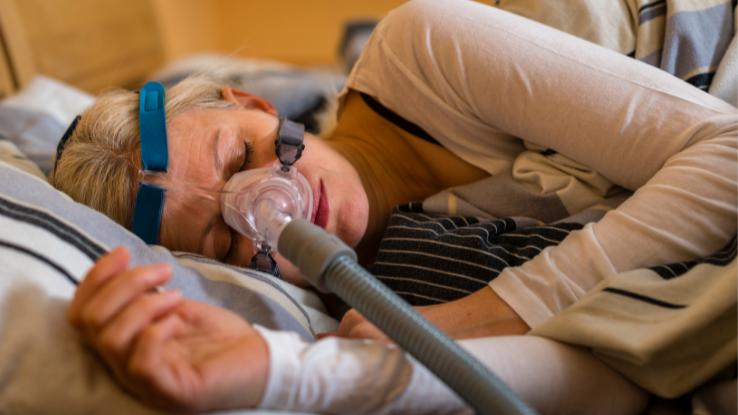Air Late Night Tales Continuous Mix

Waking up in the middle of the night gasping for air can be a distressing experience. If you frequently experience such episodes, it's important to get to the root of the issue. However, there are many different underlying causes that could be contributing to this experience.
With proper assessment, the causes are usually easy to identify and manage. However, if left untreated, some medical conditions that present with this symptom can prove to be fatal. It is important to pay attention to your sleep patterns and consult with your healthcare provider if you are consistently wake up over the course of the night due to lack of air.
1. Stress
Sometimes, the physical symptom of waking up in the middle of the night and feeling out of breath has a psychological cause. When a person is under extreme stress or is experiencing anxiety, it is very possible to suddenly wake up in the middle of the night with excessive sweating, rapid heartbeat or shortness of breath.
This can be caused by a vivid nightmare — or, in severe cases, it is possible to experience a panic attack while sleeping. Episodes of panic at night typically only last a few minutes, but they can be quite disruptive to sleep patterns. If frequent waking and shortness of breath correlates with your stress levels, consider talking with a mental health professional to discuss methods of coping and stress relief.
2. Post-nasal Drip
For those prone to nasal allergies or bad nasal colds, post nasal drip may be a familiar discomfort. While sleeping, nasal secretions can migrate down to the throat and temporarily block the airway. When the brain senses that the airway is obstructed and oxygen cannot easily flow to the lungs, it sends signals to the chest muscles to cough and gasp for air.
Thus, people with post-nasal drip may wake up feeling like they are suffocating. Post nasal drip can usually be alleviated with antihistamines or nighttime cold medicine. If this becomes a chronic problem, consider speaking with an ear, nose, and throat (ENT) specialist for more information.
3. Asthma Flares
For those living with asthma, it is not uncommon to experience symptoms at nighttime or while already sleeping. During an asthma attack, the lining of the airway becomes swollen and thick mucus is produced, which can be the culprit of air shortage.
Nighttime triggers can include cold air, bedroom allergens, or consumption of certain foods or beverages near the end of the day. Usually, asthma episodes are accompanied by wheezing and shortness of breath, and they can be life-threatening. Talk with your healthcare provider to find out about preventative options.

4. Sleep Apnea
Sleep apnea is a sleeping disorder that can cause people to wake up in the middle of sleep due to lack of oxygen. Sleep apnea can be related to improper signaling from the brain, which is meant to maintain one's breathing during sleep, or due to a physical obstruction of the airway. Airway obstruction can be linked to excess tissue or inflammation, enlarged tonsils, or the natural relaxation of the soft palate in the back of the throat during sleep.
Periods of 10 seconds or longer without active breathing lead to decreased blood oxygen levels and frequent waking. Be sure to consult with a healthcare professional if you suspect you have sleep apnea, because if undiagnosed for long periods of time, this condition can lead to severe complications with the heart and lungs.
5. Heart Failure
Heart failure can cause shortness of breath that is worse when lying down and can wake a person up in the middle of the night. This condition is also known as paroxysmal nocturnal dyspnea, and it can be fatal if left untreated.
Paroxysmal nocturnal dyspnea is commonly accompanied by decreased exercise tolerance — such as getting winded when climbing a flight of stairs — and ankle swelling, due to fluid buildup in the body as a result of weakened heart function. If your waking episodes are related to heart failure symptoms, reach out to your healthcare provider for tips on safe sleep habits.
6. Pulmonary Edema
Another common cause for shortness of breath during sleep is pulmonary edema. Pulmonary edema is characterized by an accumulation of excess fluid in the lungs in the small lung sacs that makes breathing difficult, and it is typically associated with heart failure or a respiratory infection. When an affected individual is lying down, shortness of breath is increased, thus also increasing the risk of waking up gasping for air. Acute pulmonary edema, which is characterized by a sensation of drowning, is considered a medical emergency and care should be accessed immediately.
Next Steps
Disrupted sleep, in general, can lead to other medical conditions, such as depression, mood swings, and an inability to focus. Eventually, it can lower your quality of life and, in some cases, can prove to be fatal. With all of this in mind, be sure to consult with your doctor if you consistently wake up gasping for air.
Resource Links:
- "Post-nasal Drip" via ENT Health
- "Asthma and Sleep" via Sleep Foundation
- "Nocturnal panic attacks: What causes them?" via Mayo Clinic
- "Sleep Apnea" via National Heart, Lung, and Blood Institute
- "Sleep Apnea" via Mayo Clinic
- "Pulmonary Edema" via Mayo Clinic
- "Obstructive Sleep Apnea in Heart Failure: Review of Prevalence, Treatment with Continuous Positive Airway Pressure, and Prognosis" via Texas Heart Institute Journal, U.S. National Library of Medicine
- "Heart Failure Symptoms" via Michigan Medicine, University of Michigan
Source: https://www.thehealthfeed.com/healthy-living/reasons-why-you-wake-up-gasping-for-air?utm_content=params%3Ao%3D1668962%26ad%3DdirN%26qo%3DserpIndex&ueid=f3bc253e-f5be-4c26-b97b-b3c1e1ecf9ff
0 Response to "Air Late Night Tales Continuous Mix"
Post a Comment